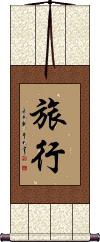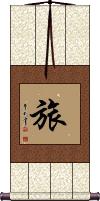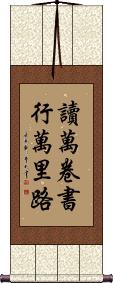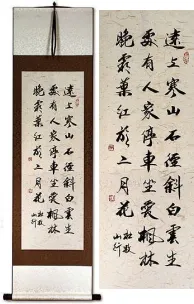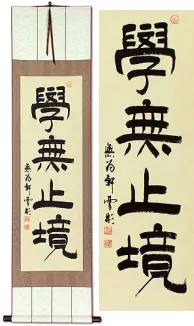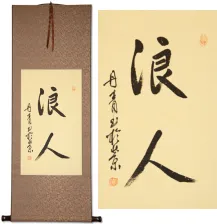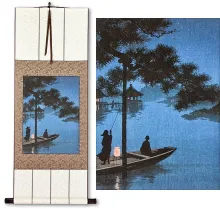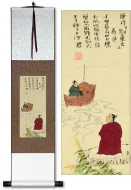Many custom options...
And formats...

Journey Travel in Chinese / Japanese...
Buy a Journey Travel calligraphy wall scroll here!
Personalize your custom “Journey Travel” project by clicking the button next to your favorite “Journey Travel” title below...
Journey / Travel
旅行 means journey or travels. It is sometimes used to refer to a vacation.
If you like a good adventure, maybe this is the word for you.
Journey / Travel
旅 is a single Chinese character, Japanese Kanji, and old Korean Hanja that means trip, travel, or journey.
In an older context, this could refer to an army brigade or a 500-man battalion from the Zhou-dynasty Chinese army.
Read 10,000 Books, Travel 10,000 Miles
讀萬卷書行萬里路 is a lifelong suggestion for expanding your horizons by gaining knowledge, experience, and seeing the world.
Of course, this was written long ago when it was hard to travel 10,000 miles (at least 1000 years before the invention of the airplane).
With air travel and the business I'm in, I often achieve that lifetime goal on a monthly basis.
However, I am a little behind in the book count.
Note: An ancient Chinese mile (里 or lǐ) referred to in this proverb is about a third of a British/American mile. However, at that time, this was a great distance to travel.
Mountain Travels Poem by Dumu
This poem was written almost 1200 years ago during the Tang dynasty.
It depicts traveling up a place known as Cold Mountain, where some hearty people have built their homes. The traveler is overwhelmed by the beauty of the turning leaves of the maple forest that surrounds him just as night overtakes the day, and darkness prevails. His heart implores him to stop, and take in all of the beauty around him.
First, before you get to the full translation, I must tell you that Chinese poetry is a lot different than what we have in the west. Chinese words simply don't rhyme in the same way that English or other western languages do. Chinese poetry depends on rhythm and a certain beat of repeated numbers of characters.
I have done my best to translate this poem keeping a certain feel of the original poet. But some of the original beauty of the poem in its original Chinese will be lost in translation.
Far away on Cold Mountain, a stone path leads upwards.
Among white clouds, people's homes reside.
Stopping my carriage I must, as to admire the maple forest at nights fall.
In awe of autumn leaves showing more red than even flowers of early spring.
Hopefully, this poem will remind you to stop, and “take it all in” as you travel through life.
The poet's name is “Du Mu” in Chinese that is: ![]()
![]() .
.
The title of the poem, “Mountain Travels” is: ![]()
![]()
You can have the title, poet's name, and even “Tang Dynasty” written as an inscription on your custom wall scroll if you like.
More about the poet:
Dumu lived from 803-852 AD and was a leading Chinese poet during the later part of the Tang dynasty.
He was born in Chang'an, a city in central China and the former capital of the ancient Chinese empire in 221-206 BC. In present-day China, his birthplace is currently known as Xi'an, the home of the Terracotta Soldiers.
He was awarded his Jinshi degree (an exam administered by the emperor's court which leads to becoming an official of the court) at the age of 25 and went on to hold many official positions over the years. However, he never achieved a high rank, apparently because of some disputes between various factions, and his family's criticism of the government. His last post in the court was his appointment to the office of Secretariat Drafter.
During his life, he wrote scores of narrative poems, as well as a commentary on the Art of War and many letters of advice to high officials.
His poems were often very realistic and often depicted everyday life. He wrote poems about everything, from drinking beer in a tavern to weepy poems about lost love.
The thing that strikes you most is the fact even after 1200 years, not much has changed about the beauty of nature, toils, and troubles of love and beer drinking.
A Bright Future
Incredible 10,000-Mile Flight of the Peng
鵬程萬里 is an ancient Chinese proverb used in modern times to wish someone a long and successful career.
It's really about the 10,000 Flight of the Peng (Peng, also known as Roc is a mythical fish that can turn into a bird and take flight).

莊子
Zhuangzi or Chuang Tzu
Breaking down each character:
1. Peng or Roc (a kind of bird).
2. Journey (in this case, a flight).
3. 10,000 (Ten Thousand).
4. Li is a unit of distance often referred to as a “Chinese Mile,” though the real distance is about half a kilometer.
Direct Translation: “Peng's Journey [of] 10,000 Li.”
Literal meaning: “The 10,000-Li Flying Range Of The Roc.”
Perceived meaning: “To have a bright future” or “To go far.”
This proverb/idiom comes from the book of Zhuangzi or Chuang Tzu. It tells the tale of a huge fish that could turn into a gigantic bird. This bird was called a “peng” and was many miles long. This legendary size allowed the Peng to fly from the Northern Sea to the Southern Sea in a single bound.
Wishing someone “a Peng's Journey of 10,000 Li” will imply that they can travel far without stopping and will have great success, a long career, and a prosperous future.
This in-stock artwork might be what you are looking for, and ships right away...
Gallery Price: $178.00
Your Price: $98.88
Gallery Price: $160.00
Your Price: $88.77
Gallery Price: $52.00
Your Price: $28.88
Gallery Price: $52.00
Your Price: $28.88
Gallery Price: $52.00
Your Price: $28.88
Gallery Price: $52.00
Your Price: $28.88
Gallery Price: $200.00
Your Price: $79.88
Gallery Price: $180.00
Your Price: $99.88
Gallery Price: $79.00
Your Price: $43.88
Gallery Price: $108.00
Your Price: $59.88
Not the results for journey travel that you were looking for?
Below are some entries from our dictionary that may match your journey travel search...
| Characters If shown, 2nd row is Simp. Chinese |
Pronunciation Romanization |
Simple Dictionary Definition |
旅行 see styles |
lǚ xíng lu:3 xing2 lü hsing ryokou / ryoko りょこう |
More info & calligraphy: Journey / Travel(n,vs,vi) travel; trip; journey; excursion; tour |
行 see styles |
xíng xing2 hsing yukue ゆくえ |
(bound form) to walk; to go; to travel; (literary) trip; journey; visit; (bound form) temporary; makeshift; (bound form) current; in circulation; (bound form) to do; to perform; capable; competent; all right; OK!; will do; behavior; conduct (Taiwan pr. [xing4]); (literary) about to; soon (n,n-suf) (1) going; travelling; traveling; journey; trip; (2) act; action; (suffix noun) (3) bank; (counter) (4) counter for banks; (counter) (5) counter for groups or parties of people; (6) type of classical Chinese verse (usu. an epic from the Tang period onwards); (7) (hist) shopping district (of similar merchants; in the Sui and Tang periods); (8) (hist) merchants' guild (in the Tang period); (female given name) Yukue Go; act; do; perform; action; conduct; functioning; the deed; whatever is done by mind, mouth, or body, i.e. in thought, word, or deed. It is used for ayana, going, road, course; a march, a division of time equal to six months; also for saṁskāra, form, operation, perfecting, as one of the twelve nidānas, similar to karma, action, work, deed, especially moral action, cf. 業. |
前程 see styles |
qián chéng qian2 cheng2 ch`ien ch`eng chien cheng zentei / zente ぜんてい |
future (career etc) prospects the journey before one; distance one has to travel |
旅程 see styles |
lǚ chéng lu:3 cheng2 lü ch`eng lü cheng ryotei / ryote りょてい |
journey; trip (1) itinerary; travel plans; (2) distance (of a trip); journey |
旅遊 旅游 see styles |
lǚ yóu lu:3 you2 lü yu |
trip; journey; tourism; travel; tour; to travel |
行程 see styles |
xíng chéng xing2 cheng2 hsing ch`eng hsing cheng koutei / kote こうてい |
journey; travel route; itinerary; distance of travel; course (of history); stroke (of a piston); (Tw) (computing) process (1) journey; course; distance; march; flight; drive; leg (of a journey, relay race, etc.); (2) itinerary; (3) stroke (of a piston); throw (of a switch) |
資斧 资斧 see styles |
zī fǔ zi1 fu3 tzu fu |
(literary) money for a journey; travel expenses |
車程 车程 see styles |
chē chéng che1 cheng2 ch`e ch`eng che cheng |
travel time; expected time for a car journey |
遊行 游行 see styles |
yóu xíng you2 xing2 yu hsing yugyou / yugyo ゆぎょう |
to march; to parade; to demonstrate; procession; march; demonstration; to travel around; to roam (n,vs,vi) (See 行脚・1) pilgrimage; travelling around (by a monk); (given name) Yugyou To roam, wander, travel, etc. |
遠行 远行 see styles |
yuǎn xíng yuan3 xing2 yüan hsing enkou; engyou(ok); ongyou(ok) / enko; engyo(ok); ongyo(ok) えんこう; えんぎょう(ok); おんぎょう(ok) |
a long journey; far from home (noun/participle) (1) going afar; (noun/participle) (2) dying; death to travel far |
旅する see styles |
tabisuru たびする |
(vs-i,vi) to travel; to take a trip; to make a journey |
傷心旅行 see styles |
shoushinryokou / shoshinryoko しょうしんりょこう |
(exp,n) travel to relieve heartbreak; sentimental journey |
走行時間 see styles |
soukoujikan / sokojikan そうこうじかん |
journey time; travelling time; travel time; transit time; run time |
The following table may be helpful for those studying Chinese or Japanese...
| Title | Characters | Romaji (Romanized Japanese) | Various forms of Romanized Chinese | |
| Journey Travel | 旅行 | ryokou / ryoko | lǚ xíng / lv3 xing2 / lv xing / lvxing | lü hsing / lühsing |
| Journey Travel | 旅 | ryo / tabi | lǚ / lu:3 / lu: | lü |
| Read 10,000 Books, Travel 10,000 Miles | 讀萬卷書行萬里路 读万卷书行万里路 | dú wàn juǎn shū, xíng wàn lǐ lù du2 wan4 juan3 shu1 xing2 wan4 li3 lu4 du wan juan shu xing wan li lu duwanjuanshuxingwanlilu | tu wan chüan shu hsing wan li lu | |
| Mountain Travels Poem by Dumu | 遠上寒山石徑斜白雲生處有人家停車坐愛楓林晚霜葉紅於二月花 远上寒山石径斜白云生处有人家停车坐爱枫林晚霜叶红于二月花 | yuǎn shàng hán shān shí jìng xiá bái yún shēng chù yǒu rén jiā tíng chē zuò ài fēng lín wǎn shuàng yè hóng yú èr yuè huā yuan3 shang4 han2 shan1 shi2 jing4 xia2 bai2 yun2 sheng1 chu4 you3 ren2 jia1 ting2 che1 zuo4 ai4 feng1 lin2 wan3 shuang4 ye4 hong2 yu2 er4 yue4 hua1 yuan shang han shan shi jing xia bai yun sheng chu you ren jia ting che zuo ai feng lin wan shuang ye hong yu er yue hua | yüan shang han shan shih ching hsia pai yün sheng ch`u yu jen chia t`ing ch`e tso ai feng lin wan shuang yeh hung yü erh yüeh hua yüan shang han shan shih ching hsia pai yün sheng chu yu jen chia ting che tso ai feng lin wan shuang yeh hung yü erh yüeh hua |
|
| A Bright Future | 鵬程萬里 鹏程万里 | péng chéng wàn lǐ peng2 cheng2 wan4 li3 peng cheng wan li pengchengwanli | p`eng ch`eng wan li pengchengwanli peng cheng wan li |
|
| In some entries above you will see that characters have different versions above and below a line. In these cases, the characters above the line are Traditional Chinese, while the ones below are Simplified Chinese. | ||||
Successful Chinese Character and Japanese Kanji calligraphy searches within the last few hours...
